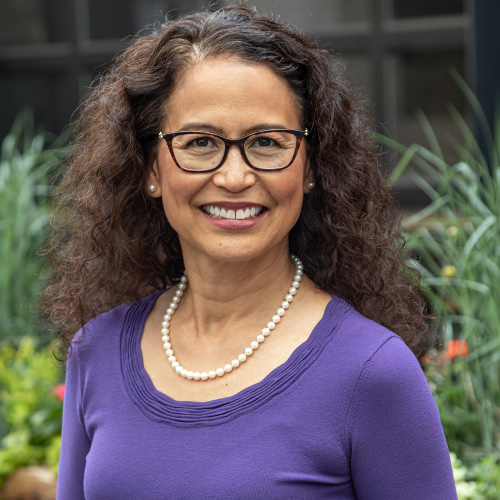Chief Financial Officer

Joanne Flores Moses comes to NEFE after 20 years at the Boettcher Foundation in Denver. Born in Guam and raised everywhere from Oklahoma and New York to Libya, due to her father’s career in the U.S. Air Force, Joanne earned a bachelor’s degree from the University of Denver and is a certified public accountant (CPA®).
How did you learn about money growing up?
My parents were pretty frugal, but I can’t say I remember learning about money at home. I was born in 1961—of course, there was no internet—and, I learned a lot from TV. Seeing things on the news and talk shows like “Oprah.” I would hear about a book on personal finance and then I’d go get the book.
Even having an accounting degree and becoming a CPA doesn’t tell you how to manage your own money. In college, I started getting credit card offers and back then, nobody was talking about how to build good credit. So, I signed up for a credit card. But through that, I started to learn that if you only make the minimum payments, you will never pay it off. I’m smart and I know math, but that wasn’t really intuitive. Part of my learning came through experience.
Later in my career, I was laid off. That event was a real wake-up call. I had never thought about what would happen if my paycheck stopped, even for a month. Some of that kind of learning comes just as your life happens.
How has being at NEFE impacted your views on financial education?
Today, it’s almost the opposite situation from when I was growing up. There is so much information out there that you don’t know what good advice is. At least teaching the basics of personal finance in schools gives people an understanding to make their own choices.
When I had a credit card, you could deduct credit card interest on your tax return. At the time, having that interest was not as negative as it is today. When rules change, or tax laws change, or your credit card company updates your agreement for the thousandth time, there is just so much information being thrown at you. What you do with that information is up to you. Having basic personal finance knowledge, just like having basic math, at least gives you a starting point.
What led you to pursue nonprofit work?
I was laid off when I was seven months pregnant. Luckily, I knew it was coming a year in advance, and I had a great severance package. I got to stay home for 2 1/2 years. It was such a treasure. Then I started doing contract work. I had received the Boettcher Foundation scholarship in high school, and I had a long-standing relationship with them. I reconnected with them in 1998 and eventually came onboard as a part-time controller. That introduced me to private foundations, which is really how I got into nonprofits.
How would you describe your job to a fifth-grader?
Along with my team, we support those who do the work of our mission. We make sure they have working computers and equipment, that people get paid, and that NEFE is compliant with the tax laws and rules that govern nonprofits. I also manage the money that NEFE was given when it first started to make sure it lasts into the future.
What do you find most interesting in your role at NEFE?
As opposed to the Boettcher Foundation—which is a private, nonoperating, grant-making foundation—NEFE is an operating foundation. There are a lot of similarities, but also enough differences, that it’s really interesting to me. Also, after 20 years at Boettcher, I certainly didn’t have the fresh eyes that I have here. The people at NEFE are so great and I’m excited to be part of this next chapter for the organization.
